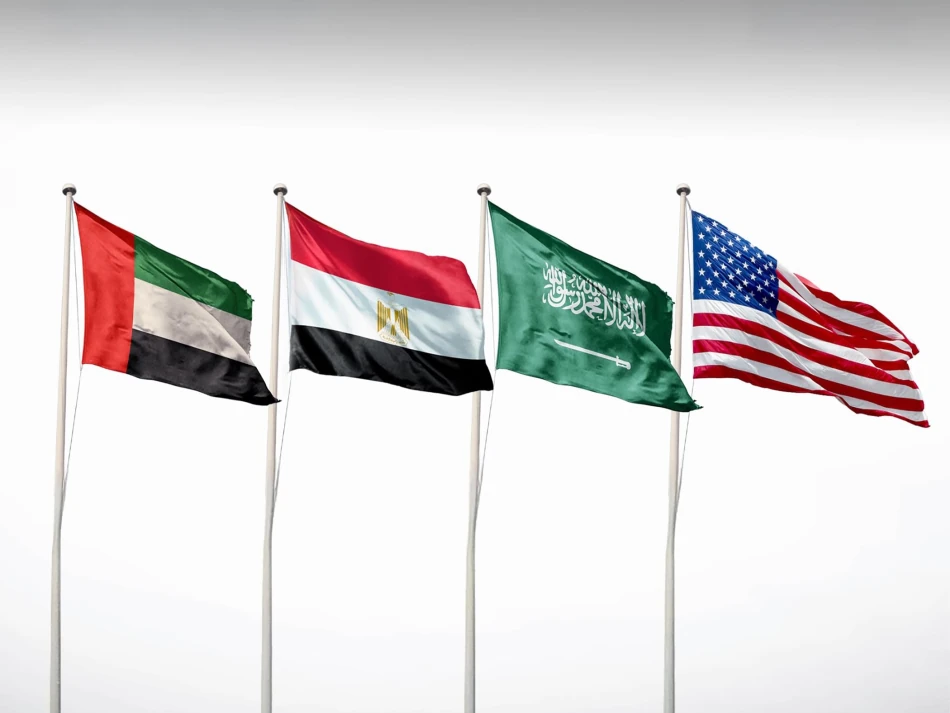
UAE, Saudi, Egypt, and US Foreign Ministers Issue Joint Statement on Restoring Peace and Security in Sudan
Four-Nation Coalition Demands Military Solution End to Sudan's "World's Worst Humanitarian Crisis"
The United States, UAE, Saudi Arabia, and Egypt have issued a joint ultimatum calling for an immediate end to external military support fueling Sudan's devastating civil war, while proposing a three-month humanitarian ceasefire followed by a nine-month transition to civilian rule. The unprecedented diplomatic intervention signals growing international alarm over a conflict that has created what the coalition terms "the world's worst humanitarian crisis" and threatens regional security across the Red Sea corridor.
Strategic Realignment in Regional Diplomacy
The quartet's joint statement represents a significant shift in Middle Eastern diplomatic coordination, bringing together traditional regional rivals under U.S. leadership to address Sudan's spiraling conflict. The initiative follows intensive consultations between foreign ministers, reflecting mounting concerns that Sudan's war between the Sudanese Armed Forces and Rapid Support Forces could destabilize the broader Red Sea region—a critical global shipping route already disrupted by Houthi attacks.
This diplomatic formation mirrors successful regional coalitions that have emerged during previous Middle Eastern crises, but notably excludes Iran and Turkey, signaling a clear geopolitical alignment against what the statement describes as "destabilizing regional and local parties" seeking to exploit Sudan's chaos.
The Economic Stakes Behind the Humanitarian Crisis
Sudan's collapse carries profound economic implications beyond humanitarian concerns. The country sits at the intersection of Africa and the Middle East, controlling access routes between the Red Sea and the African interior. Its potential as an agricultural powerhouse and mineral-rich territory makes it strategically valuable to regional powers seeking to expand their economic influence.
The coalition's emphasis on ending external military support directly challenges reported arms flows from various regional actors, including alleged weapons supplies that have prolonged the conflict. For investors and regional economies, Sudan's instability threatens supply chains and creates refugee flows that strain neighboring countries' resources.
Timeline for Political Transition
The proposed framework establishes an ambitious timeline: a three-month humanitarian ceasefire leading to permanent cessation of hostilities, followed by a nine-month comprehensive transition process. This accelerated schedule suggests the coalition believes rapid action is essential to prevent further regional spillover effects.
The statement explicitly warns against allowing "violent extremist groups affiliated with or documented ties to the Muslim Brotherhood" to dictate Sudan's future, reflecting broader regional concerns about Islamist influence that have shaped Middle Eastern politics since the Arab Spring.
Red Sea Security Imperatives
The coalition's focus on "ensuring broader Red Sea regional security" reveals strategic calculations beyond Sudan's borders. With global shipping already disrupted by regional conflicts, Sudan's potential as a failed state hosting terrorist organizations or proxy forces represents an unacceptable risk to international commerce and energy flows.
Egypt's participation is particularly significant given its dependence on Nile River waters and concerns about refugee flows. The UAE and Saudi Arabia's involvement reflects their broader competition with rival powers for influence across the Horn of Africa, where China and Russia have also sought strategic footholds.
International Coordination and Next Steps
The ministers committed to supporting existing diplomatic tracks, including the Saudi-U.S. Jeddah Process for achieving permanent ceasefire and Egypt's initiative hosting Sudanese civilian and political forces. This multi-track approach suggests recognition that previous single-channel diplomatic efforts have failed to gain sufficient traction.
The coalition's agreement to reconvene in September 2025 indicates expectations that implementing their proposed timeline will require sustained high-level diplomatic pressure. Their readiness to work with African, Arab, and UN partners suggests an understanding that legitimacy requires broader international backing beyond the four-nation group.
Whether this diplomatic initiative can succeed where previous efforts have failed will depend largely on the coalition's ability to enforce consequences for non-compliance, particularly regarding the crucial demand to end external military support that has fueled the conflict's escalation.
Most Viewed News

 Sara Khaled
Sara Khaled






